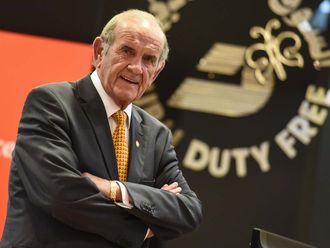
House-techno DJ Nicole Moudaber lives in a digital world.
“For electronic DJs, we’re not musicians, we’re not in a band, that is a completely different culture,” she told tabloid! ahead of her May 15 set at Nasimi Beach.
Instead of drums and guitar, Moudaber mastered the big three tools of her trade: knowledge of the music she plays, a passion for it and the technical skills to be able to manipulate her mixers, effect machines and the decks.
“If you have these three, I don’t see why you won’t succeed with a lot of dedication and hard work,” she said.
Readying herself for her Dubai set, the Nigeria-and-Lebanon raised Moudaber shared her special relationship with DJ Carl Cox and why the Middle East still has a lot to learn.
Q: When you were starting out in Lebanon, it was a bit of a struggle. What’s a struggle you face now?
A: For me, right now? There is no struggle, because I’m playing in first world markets, as you would say, and it’s quite developed and people understand the culture. Whereas in developing countries, such as Beirut, Asia, places like that, there would be a struggle because of the lack of knowledge that the crowd has. It’s also very exciting at the same time to be able to educate and convert people to the work that we do.
Q: You and Carl Cox are good friends. What draws you two to each other?
A: We speak the same language, musically. I release on his label and now we did a collaboration that’s coming out on my label. We played together all over the world.
Q: You’ve said that the underground is alive and well — what’s the underground to you?
A: Non-commercial — what you don’t hear on the radio is on the ground. It has more longevity — what we do can last 30 years whereas one-hit-records can die after two months and that’s it, you just don’t want to hear about them anymore.
Q: How do you discover new music?
A: They send us tonnes of promos everyday, labels from around the world. It’s quite time-consuming to go through everything, but we normally get records two months before they’re out, so we listen to them before they get released — this is how we’re ahead of the game.
Q: What do you think of Middle East when it comes to the genre?
A: I used to be a promoter in Beirut — I initially brought up the first DJs in the Middle East and paved the way for what’s happening today, which I’m quite proud of. It has evolved — I think it can evolve a bit more. I think [the Middle East] needs to be exposed to different genres of music rather than what’s on the radio.
Q: Do you think there’s a line between the radio DJ (Calvin Harris, Avicii, etc.) and the underground DJ?
A: Of course. What the Aviciis and Calvin Harrises are doing is not really what we do. I call it pop dance, what they play, and it’s completely different than what we do. What we play is a bit more intelligent. It doesn’t have three simple notes that they write on a track, which I call Christmas carol melodies. It’s a bit more clever.











